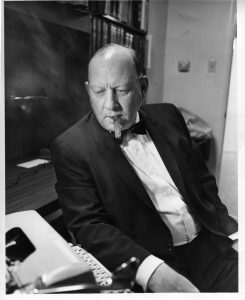The year was 1969.
Neil Armstrong took “one giant leap for mankind” on the lunar surface.
400,000 people in various forms of dress (and undress) hung out at a dairy farm in Bethel, New York, for a three-day musical happening known as Woodstock.
The last episode of the original Star Trek series aired on NBC. In the episode, titled “Turnabout Intruder,” one of Captain Kirk’s former lovers steals his body. (His toupee later showed up on a show called T. J. Hooker.)
And in Woodland Hills, California, a criminal lawyer named Art Bell released his pet project, a digest of the latest developments in search & seizure law, in an ingenious flip card binder that lawyers could carry to court. Before personal computers were even a gleam in Steve Jobs’s eye, this handy-dandy compendium could be used to instantly find a case on point during a suppression motion.
It was an immediate bestseller to California’s legal community.
 Art Bell, my dad, did all the reading and research and squibbing of the case law, and sent out revisions ten times a year. In those early days he typed all the squibs himself on an IBM Selectric Composer. He then handed the text off to a graphic artist, who happened to be my older brother, Tim, who would roll hot wax on the backs of the cards, then use an X-Acto knife to slice the lines. These would be applied to a new card for photography and reproduction.
Art Bell, my dad, did all the reading and research and squibbing of the case law, and sent out revisions ten times a year. In those early days he typed all the squibs himself on an IBM Selectric Composer. He then handed the text off to a graphic artist, who happened to be my older brother, Tim, who would roll hot wax on the backs of the cards, then use an X-Acto knife to slice the lines. These would be applied to a new card for photography and reproduction.
The whole thing was a family—and neighborhood—affair. Almost immediately Dad hired our next-door neighbor, a divorcee with four kids to raise, as assistant editor and all-around office administrator. Joan Blackmer remained an integral part of Bell’s Compendium for 41 years.
When Dad died in 1988, I’d been working with him for a couple of years, and was there to take up his work. And that’s what I’ve been doing ever since. My wife, Cindy, works alongside me handling the office and administration. It has been my honor to carry on Dad’s enterprise, and to be of service to practitioners of the law in California.
Thank you all for your support over the years. Onward we go!
Detention and Pat Down Search Invalid Based on Vague Description of Defendant and Possible Criminal Activity
- THOMAS, 29 CA5 1107, 241 CR3 87 (18) #C083845:
The facts were stated by the court as follows:
In the middle of the day, a person contacted law enforcement officers to report an adult black male wearing a sweatshirt and dark pants was “harassing” customers. The subject appeared to have some mental health problems and had “set up camp.” The area was a high-crime area, with a high number of transients and homeless people. The area also has a “fair amount” of foot traffic due to numerous retail shops and restaurants. Two and one-half hours after they received the call, law enforcement officers arrived to the area. They saw defendant sitting on the sidewalk, approximately 80 yards away from the business. He was wearing a Windbreaker, sweatshirt, and dark pants. There was no one else in the area.
Def repeatedly refused to ID himself and when asked if he was on probation, got up and started walking away. Offs put him in a control hold and handcuffs, then pat searched him. They removed a knife and a pipe and “observed” an EBT card with Def’s name. They ran a check and found out Def was on probation, then searched him more fully and found meth.
Def’s 1538.5 motion was denied. The Court of Appeal, per Robie, J., reverses, holding that the totality of circumstances were not enough to justify a detention.
The description was too vague.
There was a long lapse of time between the report and the arrival of the police. Def’s proximity to the scene of the reported harassment was not enough, considering it was a highly trafficked pedestrian area.
There were no facts reported indicating the “harassment” had any criminal elements.
Also, the probation search condition was not known to the officers when the detention and handcuffing took place.
Valid Consent by Wife to Search Home for Weapons
- Neal, 29 CA5 820, 240 CR3 629 (18) #A153101:
Def was acting in a suicidal manner at a river marina in Antioch, CA. Off. questioned him. Def. said he was previously in the military and had been a police officer and possessed police and military weapons at his home. He was taken to the hospital for evaluation.
Offs then went to Def’s residence and explained why they were there. She responded that there were weapons inside and she wanted them out of the house. She then let them in and showed them to a closet in the bedroom, where they found six firearms. They collected the firearms for safekeeping and provided Neal a property receipt. Later they found out Def had a prior felony conviction.
Def’s 1538.5 motion was denied, and the Cour of Appeal, per Kline, PJ, affirmed.
The sole issue was the consent by the wife:
[T]he trial court’s factual determination that appellant’s wife consented to the search based on her own desire to get rid of the guns, not because she felt legally compelled to do so, is amply supported by substantial evidence.
